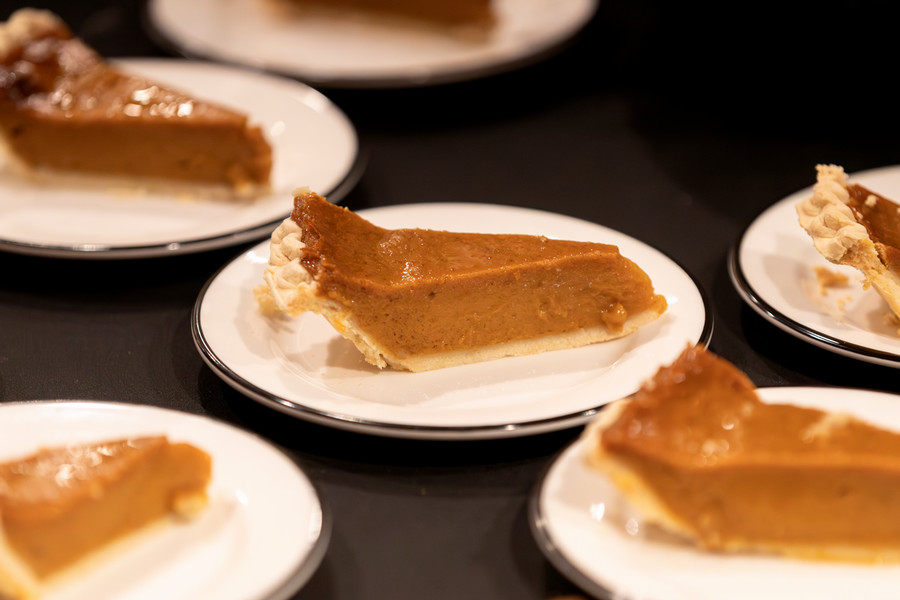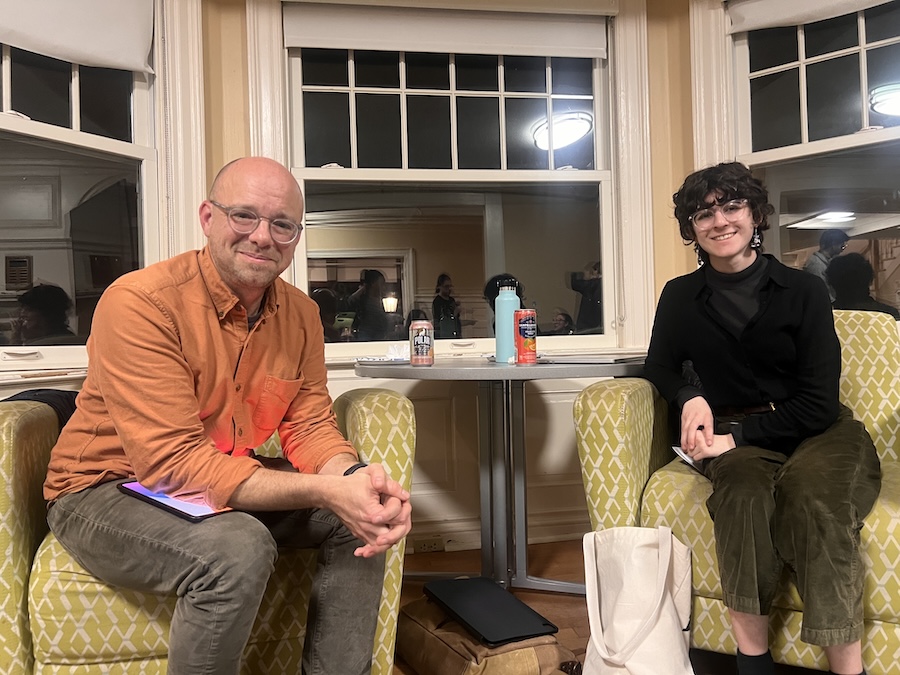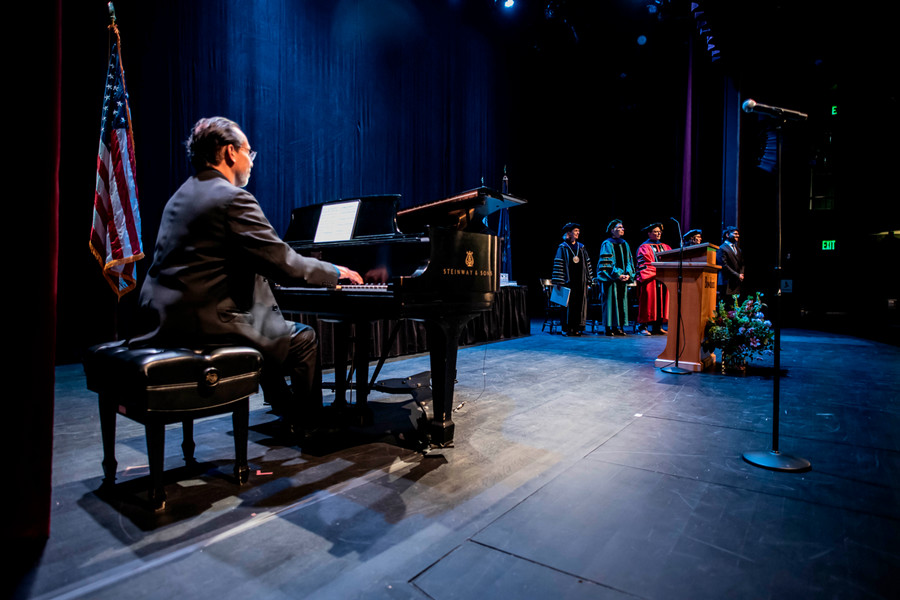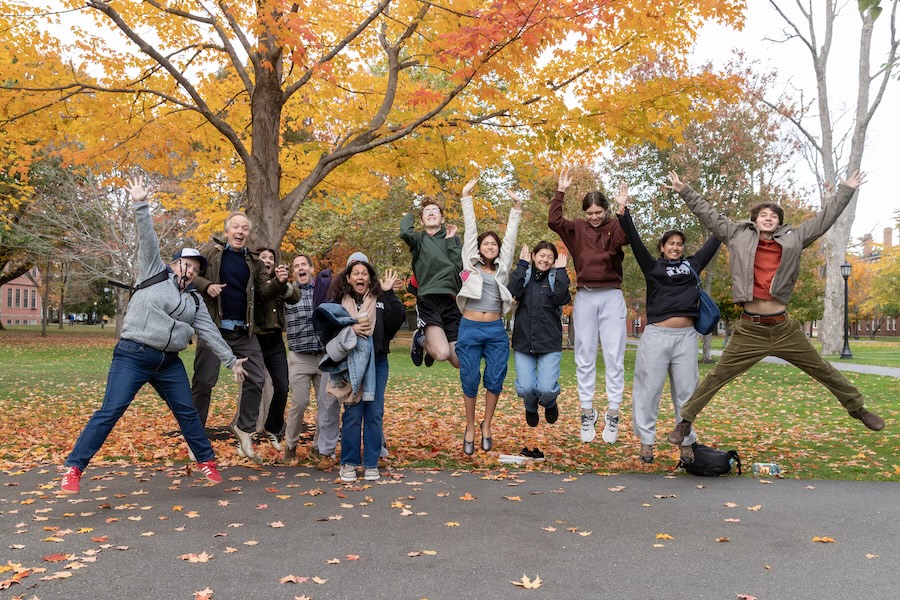Baccalaureate Address by Nobel Laureate Thomas Cech H’18
By Rebecca GoldfineThomas R. Cech
First, congratulations graduates. And you wouldn’t be here without parents, family, and friends so congratulations to all of you as well.
The title of my talk today is “Learning Liberally, Looking Back, Leaping Along.” Had I been better at the humanities, I probably could have alliterated the entire thing but I couldn’t quite manage it. And so, first, looking back a number of decades, my wife Carol, who is here with me today, and I graduated together both as chemistry majors from Grinnell College
And we heeded Horace Greeley’s advice, which was given, by the way, to Joshua B. Grinnell, to go West. Well, Grinnell got only as far as Iowa. But in our case, we made it to California to enter grad school at the University of California Berkeley. And we drove across the prairies and the deserts, we were pondering, you know, how would our liberal arts education at this small college in a small town prepare us for graduate studies at one of the world’s premiere research universities? And would we be overwhelmed by other student who had studied at ivy league universities or technical schools, like MIT or Caltech.
Well, as the students today would say, we could chill. First, many of our – maybe they don’t say that anymore. That was last year. First, many of our classmates also hailed from liberal arts colleges, which, at that time, granted seven percent of the nation’s bachelor’s degrees. And, second, through some combination of our own hard work and our liberal arts education, it turned out that we were very well-prepared. And as I’ll discuss some more in a minute
Many of the students from large schools knew more stuff than we did, facts and equations, but they hadn’t had as much experience in learning how to learn. Now, let’s leap along to the present, to you, the graduates. You are the two percent. Why did the seven percent of degrees from liberal arts colleges go down to two percent? Well, there’s been a large increase in college graduates but all of that increase has been at institutions such as my own, University of Colorado-Boulder, where science and engineering are magnets for graduates. I think, driven in large part because it seems like such a straightforward road to a job.
But your liberal arts education will serve you so very well, not just as a road to a job but also as a road to your life. And why is that the case? Well, why isn’t just learning more and more facts the road to success? Because things are changing so rapidly. Think about how the world today is already different than the world you lived in, in high school, let alone when you started at Bowdoin. Self-driving cars have gone from science-fiction to reality. Big data is being mined all the time by AI and machine learning.
Just a few years after the blockbuster videotape revolution had crashed, the next generation of media, CDs and DVDs, are already going to distinction. And electric plug-in vehicles allow us to never take a trip to a gas station or have an oil change. And every time I turn on my plug-in LEAF, it asks me if I’m okay with it transmitting all the data it can glean about my driving to the cloud. Presumably, it wants to know how fast I drive to Starbucks on the way to work so they can sell that data to someone who wants to then try to sell me something that would jive with my habits.
I always touch decline on the touchscreen but one of these days, my finger will slip and I’ll touch approve, and that’ll be the end of it. Right. Because from then on, it’ll never ask me again, and I’ve accidentally agreed to let my car transmit my behavioral data for as long as our relationship lasts – my relationship with the car that is. So, with the world changing so rapidly, the very idea that the value of your college education is that you’ve learned a lot of stuff is suspect. Instead, you’ve ben learning how to learn.
And it is that skillset, totally adaptable to every new set of facts and technologies, that will allow you to contribute to your family, your community, your country, and your world tomorrow, and next year, and even half a century from now. So, what are those skills that you’ve learned already to some extent, and will continue to learn because it’s a process, right?
Well, a few of them are critical thinking, not just to appreciate what scholars have discovered and have said but to evaluate it, to test those so-called truths, try to build upon them, to be skeptical of other people’s explanations. But not in a cynical way but in a way that we all understand that learning is a process and that other people may not have quite gotten it all right.
Secondly, to test and to access information and ideas, not just Google search, but learning how to work in a team, and learning from others whose diverse backgrounds and ways of thinking complement your own ideas to come to a more robust and a more – and a stronger solution to a question. And, finally, to articulate your ideas, speaking in writing in an engaging and logical manner to make it crystal clear what you think and why you think it so that others may help you improve on your ideas.
So, these are some of the how to learn skills that will serve you well even as the facts and the data continue to grow and change through the years. Thank you.



